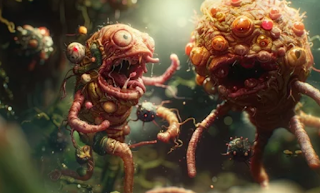For years, scientists have been buzzing about the potential link between the trillions of bacteria living in our guts- the gut microbiome - and our mental health. But a new, large-scale study throws some cold water on the idea that these tiny tenants directly influence children's mental health - at least, not in the clear-cut way we might have thought.
The Plot Thickens: No Simple Gut-Brain Connection Found
Researchers in the Netherlands analyzed data from nearly 1800 10-year-olds. They looked for associations between the children's gut bacteria and their mental well-being, considering everything from anxiety and depression to behavioral issues. Surprisingly, they found no strong evidence of a direct link. This contrasts previous studies that reported connections between gut bacteria and mental health problems.
So Why the Different Results?
- There are a couple of possible explanations for the discrepancy. First, this study took a different approach than many past ones.
- Instead of focusing only on children diagnosed with mental health issues, it examined the entire spectrum of mental health symptoms in the general population. Any gut-brain connection may be more assertive in children with severe symptoms, who weren't the main focus here.
- Another possibility is timing. The study looked at 10-year-olds, which might be too early to catch a gut-mental health link. Some mental health disorders, like depression, often emerge later in adolescence or adulthood. The gut bacteria's influence might increase, but not at age 10.
But Wait, There's More! Hints of a Microbiome-Mental Health Story
While the study didn't find a slam-dunk connection, it did uncover some interesting tidbits, according to Kraaij and colleagues (2022):
- Certain bacterial groups (Hungatella, Anaerotruncus, Oscillospiraceae) showed tentative links to specific mental health issues. Additionally, the researchers identified potential metabolic pathways in the gut that might be connected to mental health problems.
- Their findings warrant further investigation.
- The study highlights the need for more rigorous research on the gut-brain connection in children.
- Future studies should involve larger, more diverse groups and consider factors that might influence the results. Additionally, exploring the impact of gut bacteria on the early signs of mental health problems, rather than just diagnosed conditions, could be key.
The bottom line? The jury's still out on whether your child's gut affects their mood. While the study doesn't support a clear link, it allows
future research to refine our understanding of this complex interplay.
References
- Kraaij, Robert & Schuurmans, Isabel & Radjabzadeh, Djawad & Tiemeier, Henning & Dinan, Timothy & Uitterlinden, André & Hillegers, Manon & Jaddoe, Vincent & Duijts, Liesbeth & Moll, Henriette & Rivadeneira, Fernando & Medina-Gomez, Carolina & Jansen, Pauline & Cecil, Charlotte. (2022). The gut microbiome and child mental health: A population-based study. Brain, Behavior, and Immunity. 108. 10.1016/j.bbi.2022.12.006.






No comments:
Post a Comment